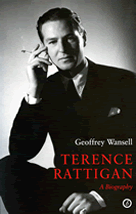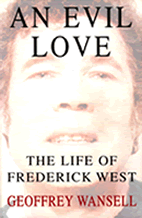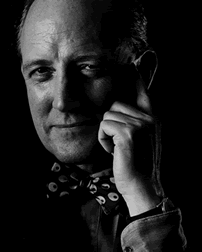
Geoffrey Wansell: Daily Mail, 18th January 2010
Mo Mowlam lied to Tony Blair that her brain cancer was benign so she'd get a Cabinet job, new film reveals.
The scene is a highly polished office at Charing Cross Hospital in West London in the first weeks of 1997 - just four months before New Labour swept to power at the General Election.
The patient sitting in front of distinguished cancer consultant Dr Mark Glaser is one of the most popular politicians in the land.
She is the ambitious, straight-talking Labour MP Mo Mowlam - the Shadow Secretary of State for Northern Ireland, no less - who is widely expected to join Tony Blair's first Cabinet when he enters Downing Street.
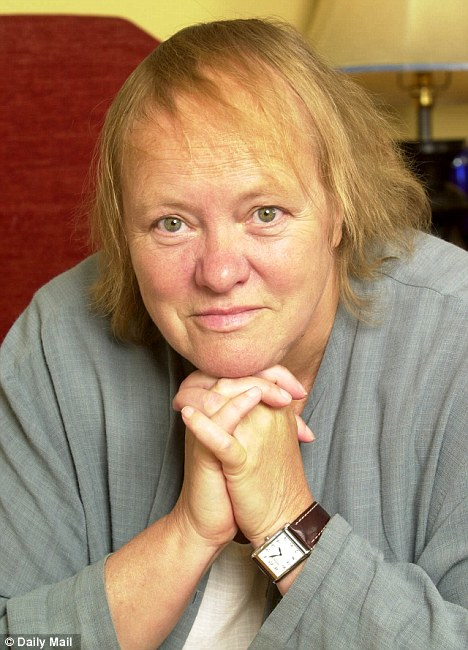
Mo Molam
Mo Mowlam kept her malignant tumour, diagnosed early in 1997, a secret until her death in August 2005
But the doctor's news isn't good. Glaser has discovered the 47-year-old has a malignant brain tumour. He explains to Mowlam that she has probably got no more than three years to live, an estimation based on the experiences of many other patients he has treated for similar tumours.
In gentle but authoritative tones, Glaser says that he will begin an intensive course of radiotherapy immediately to slow down the tumour's inevitable growth. But for his patient, there are already other worries weighing heavily on her mind. Suddenly, all Mowlam's dreams of a place at the heart of government and power - which seemed so certain just moments before - have been swept away. Or have they?
As a Channel 4 drama about Mowlam's life will reveal later this month, it was this moment which prompted an extraordinary political deception. Mowlam decided to lie to the world about her malignant tumour - in spite of warnings that her illness could cloud her judgment and thus dramatically undermine her suitability for one of the most sensitive positions in the Government.
And so the exuberant, ambitious Mowlam drew her cancer consultant into her plot, convincing him to protect the secret of her terminal condition.
It was a conspiracy he found deeply unsettling. Right from the outset, he begged Mowlam to tell Tony Blair. But she refused to allow him to tell anyone - not even her own GP, let alone the Prime Minister - the true nature of her illness.
All that she would reveal, first to friends and the wider world, was that she had a benign tumour and that it was 'not a problem at all'.
On that basis, Blair duly went ahead and offered Mowlam the post of Secretary of State for Northern Ireland. Despite the severity of her illness, she accepted without any hesitation. Even when her hair began to fall out as a result of her treatment, she continued bluffing, phoning Blair to reassure him that her condition, far from being terminal, was 'highly treatable'.
A courageous stand? Or the reckless act of a woman willing to lie to the Prime Minister to protect her personal political ambitions?
Dr Glaser admits that Mowlam 'was very, very cunning. She inveigled me into her complete confidence and she deceived me. I told her to tell Blair, but she didn't. She lied'.
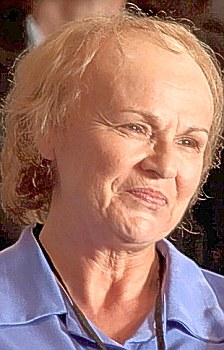
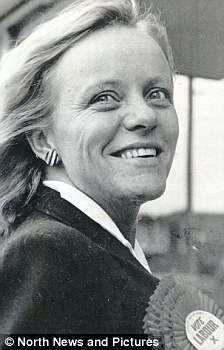
Tragic secret: Julie Walters, left, stars in a new drama about the life of the feisty MP, seen here as a young Labour candidate
We now know that the only people who did know the truth were Mowlam's husband of two years, the Labour fundraiser and merchant banker Jon Norton, and Glaser himself. The knowledge was to take a heavy toll on the respected doctor.
He says: 'I went the extra mile for her because she demanded it of me. I was trapped.'
Calling it a 'professional nightmare', Glaser, now chief of cancer services at the Imperial College NHS Trust, says: 'She was doing this very important job, one that affected so many people's lives, while she was ill. But she was also my patient and I owed her confidentiality.'
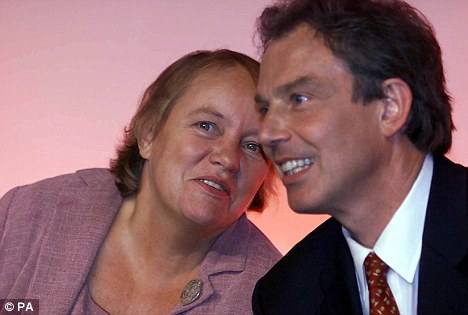
Golden years: Tony Blair with Mo Mowlam after her speech at the Labour Party Annual Conference in Brighton in September 2000.
Glaser had more to cope with than keeping his patient's trust. Mowlam insisted on a course of treatment that would enable her to continue as a high-powered politician, but which would ultimately hasten her demise.
Instead of removal of the tumour, which according to medical experts would have allowed 'functional survival for many years', Mowlam chose to have only radical radiotherapy, and took steroids to cope with the side-effects.
Over the ensuing months, Glaser continued to protect Mowlam's secret as she embarked on peace talks that would lead to the 1998 Good Friday agreement.
So fearful was Mowlam of discovery that she would insist on holding private consultations with her doctor in the grounds of her official residence, Hillsborough Castle in Northern Ireland, rather than in the building itself, in case they were bugged by the Secret Service.
Mowlam would also ring Glaser regularly at his London office before important meetings - such as the time she visited the Maze Prison to meet Loyalist paramilitaries - to ask him for anti-sickness pills.
It put an extraordinary pressure on Glaser, who was well aware that a tumour on the brain's frontal lobe, such as Mowlam's, could cause 'disinhibition, behavioural disturbance and poor judgment'.
This, at a time of high-stakes negotiations with paramilitary leaders who had brought such terror to Northern Ireland and mainland Britain.
As Glaser says: 'She was taking up a job in what was effectively a war situation.'
Yet he felt powerless. 'There was nothing I could do. I was her doctor and responsible for her care, even if she wouldn't let me keep her records in the proper places.
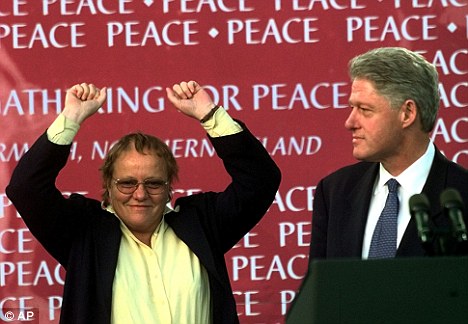
U.S. President Bill Clinton watches Mo Mowlam, then Minister for Northern Ireland, accept an uplifting welcome from thousands of people attending the 'gathering for peace' in Armagh, Northern Ireland in September 1998.
If she'd made an error that had involved a march or a bomb, how would I have felt? My judgment was that she could do the job. But, still, I didn't want anything to go wrong.'
The day Mowlam was finally removed from her job as Northern Ireland Secretary in October 1999, Glaser, overwhelmed with relief, says he 'had a stiff drink'.
He goes on: 'If she had lasted much longer, if she had not been moved, I might really have thought about going to see Tony Blair myself.'
The truth surrounding Mowlam's extraordinary deception came to light when Glaser spoke to Neil McKay, the writer of the upcoming Channel 4 drama called Mo, which stars Julie Walters as Mowlam.
Walters says of the drama: 'The politics are interesting, but they are almost in the background, eclipsed by Mo herself - which everything was. The film is about who Mo was. It's about her love for her husband, it's about caring for people, it's about her courage.'
But it is also about Mowlam's astonishing deception. Even her own sister and brother, not to mention her two stepchildren with Norton, didn't know the truth. Her close political colleagues were equally in the dark. Not even longtime friend Labour MP Clare Short, who had a relationship with Norton after Mowlam's death, knew the real story.
Even after her death in August 2005, her husband insisted to the world that she'd died as the result of a radiation overdose, which was untrue.
But just before he died last year, Norton finally admitted that the brain tumour had killed his wife. He gave McKay permission to discuss the truth with Dr Glaser for the first time.
So why has it taken so long for the truth to come out? And what was it that could have driven such a formidable and popular woman to take such an astonishing risk?
One theory is it was Mowlam's husband who encouraged her to bury the secret because their political ambitions did not end with the Northern Ireland role. There had been talk that she could even become leader of the Labour Party and Prime Minister.
The couple were bolstered by the standing ovation Mo received at the Labour Party Conference in October 1998, in the wake of her getting both Unionist and Republican support for the Good Friday agreement.
Her specialist Dr Glaser admits: 'She was so ambitious . . . [some people] did start telling her that she could become Prime Minister. That's when I started getting desperate.'
Clare Short also believes Norton was the driving force behind Mowlam's ambitions for the top job. She says:
'Jon was pushing her to that. He adored her. He thought it would be a good idea. They had dinners where they talked about it, but it wasn't real. It couldn't be.'
What remains unclear is whether Mowlam's ability to function effectively as a politician was affected by the tumour.
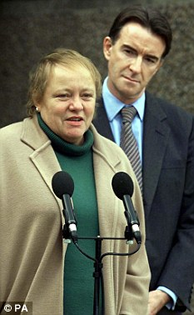
Mowlam was convinced Peter Mandelson had her removed from her Northern Ireland role so he could take over. Here she delivers her farewell speech at Stormont in Belfast.
Political friends - such as Labour MP and Minister Adam Ingram, and Charles Clarke, the former Home Secretary - were suggesting privately this weekend that she was 'perfectly under control' and her illness did not noticeably alter her behaviour.
Mowlam's enemies, on the other hand, who included Gordon Brown and Peter Mandelson, certainly did nothing to dismiss the smears that circulated during her days as Northern Ireland Secretary.
Though they, like Blair, had been told her tumour was benign, there were suspicions that her condition was taking a huge toll, and they were openly hostile towards her.
'The Westminster rumour mill was insisting: "She's sick. She's sick," ' says Mowlam's biographer, Julia Langdon. 'A lot of people thought the tumour had affected her - especially her critics, like Peter Mandelson.'
To the day she died, Mowlam was convinced that it was Mandelson who schemed to have her removed from Northern Ireland so that he could take over her job - which did happen in October 1999. 'She did mind very much,' says Clare Short. 'She did feel that Peter had helped to plot that and she didn't forgive.'
In the Channel 4 drama, Mowlam is shown describing the First Secretary of State as 'a devious ****'.
In political circles, it has long been suggested that Gordon Brown's dislike for her started on an official trip they both took to the U.S., before Labour came to power and before she married Norton.
One rumour circulating at the time was that Mowlam had propositioned Brown and been rebuffed, and as a result of which the pair began briefing against each other.
Whatever took place on the trip, Brown made sure that Mowlam was marginalised from mainstream New Labour policy-making.
Yet despite her outsider status, she certainly had a profound effect on the sometimes dour politicians of Northern Ireland - perhaps directly as a result of the 'disinhibiting' effect of her tumour.
She told Sinn Fein's Gerry Adams before he signed the Good Friday agreement: 'Bloody well get on and do it, otherwise I'll headbutt you.'
At another stage during the negotiations, Mowlam revealed her knickers to the Unionist leader David Trimble, to his utter dismay.
'It's lucky they were orange, not green,' her Minister of State, Adam Ingram, commented at the time. Mowlam laughed out loud and told him: 'It's lucky I was wearing any.'
Never afraid to be controversial, she also whipped off her wig in front of Adams and Martin McGuinness at a Stormont meeting in 1998, scratched her head vigorously and told them: 'There are some moments in life when you just need a good scratch.'
No one can deny that Mowlam made an indelible impression on Ulster's politicians and terrorists.
Mowlam's friends call the Channel 4 drama 'incredibly accurate'. But it doesn't pull any punches about the darker side of the former Northern Ireland Secretary, too, showing her as decidedly sexual, combative, foul-mouthed and, at times, deluded.
Clare Short remembers, for example, that when she first came into the Commons in 1987, Mowlam was 'slightly wild - quite sex and drugs and rock'n'roll', while Adam Ingram acknowledges that she would use her sexuality 'to a huge degree'.
But Ingram also believes that Mowlam was 'on a mission'. He is convinced her illness made no difference to her whatsoever 'and now we can only really look at what she achieved. Did she make the world a little bit better? Yes she did'.
As for the medical consultant who made the conspiracy possible, Dr Glaser now believes, despite his concerns, Mowlam was capable of doing her job in Northern Ireland effectively.
He even suggests that Mowlam's tumour may have contributed to her success because she knew that the clock was ticking and she was determined to bring about change.
'She was racing against time,' he maintains. 'I'd given her a maximum of three years.'
Such was Mowlam's success in Northern Ireland that it even encouraged her to believe she could become, at the very least, Foreign Secretary. That was not to be.
After being removed from the Northern Ireland job, she reluctantly accepted the post of Minister for the Cabinet Office, and then resigned from the Commons in June 2001.
Mowlam's tumour was taking an ever more punishing toll on her and in August 2005 - a full eight years after her diagnosis - she passed away at her home.
On hearing the news, Tony Blair said of Mo: 'She was great company, utterly irreverent, full of life and fun. Yet behind that extraordinary front presented to the world was one of the shrewdest political minds I ever encountered.'
Little did he know just how shrewd - and reckless - she had been in concealing from him the true nature of her condition for all those years.

